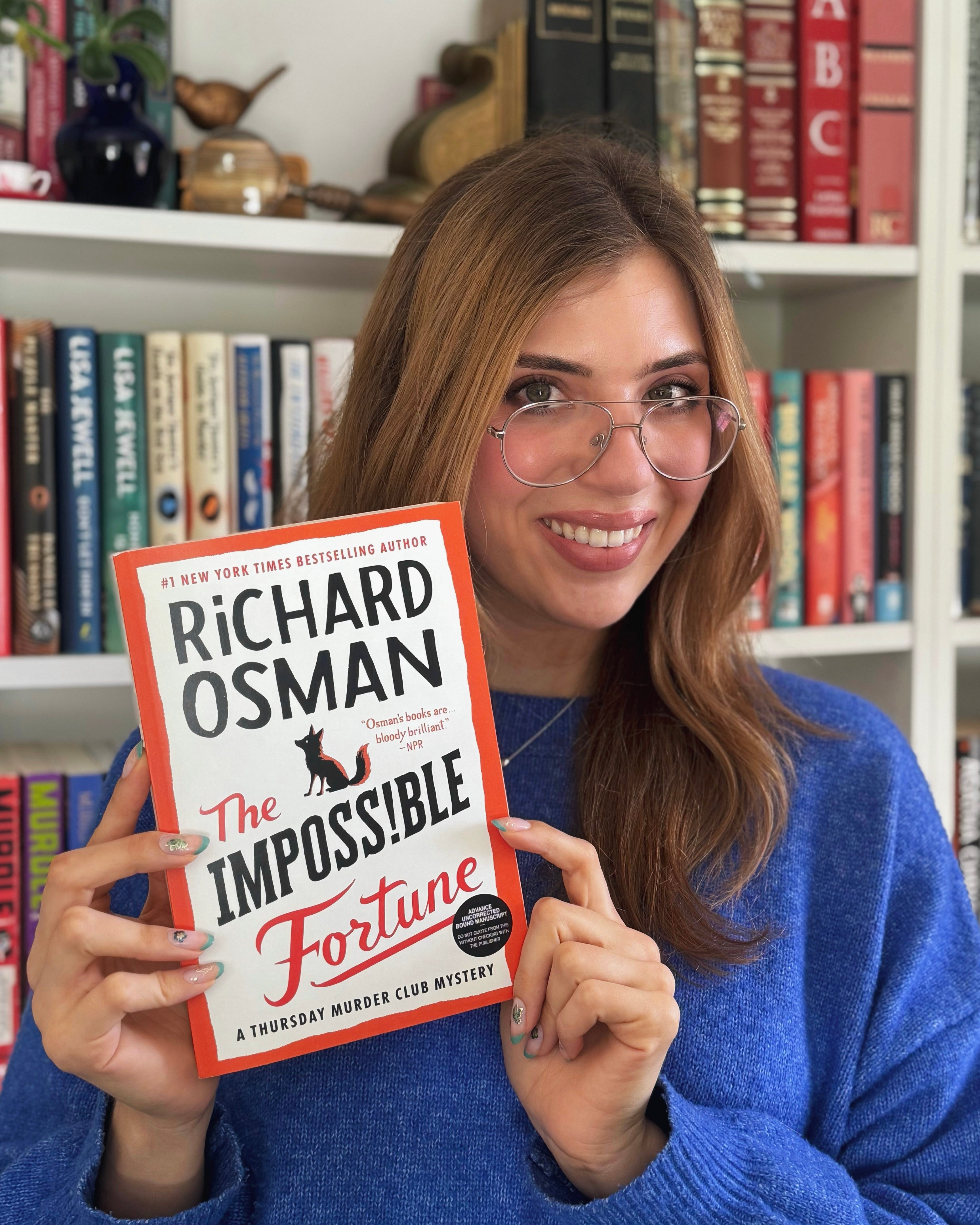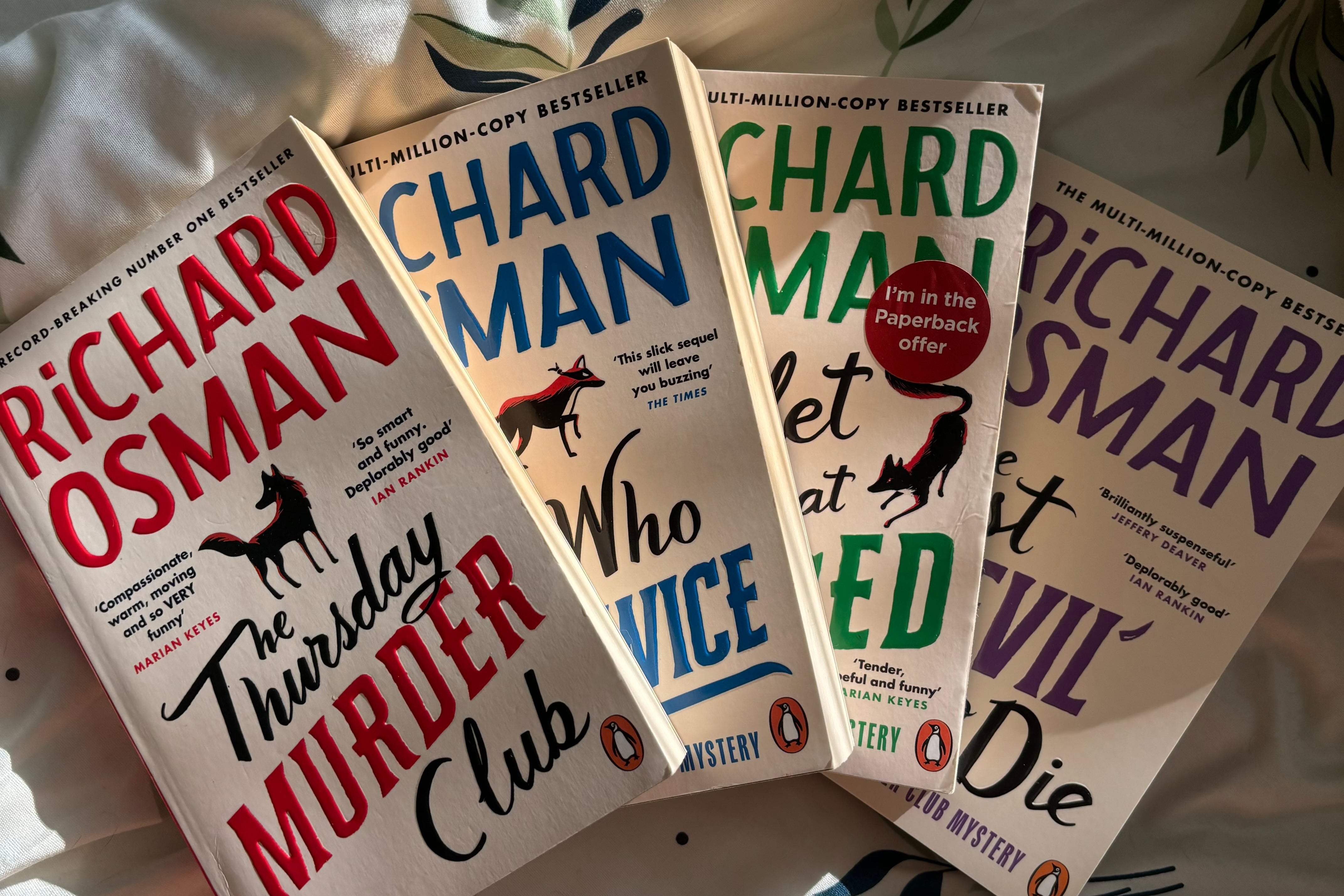There’s an army of us on TikTok.” Rhianah Parkes, 23, is talking about fans of The Thursday Murder Club. More specifically, young fans of The Thursday Murder Club. The learning and development operative from Leicestershire, who posts book review videos from the account @rhislibraryx, read the first in Richard Osman’s popular cosy crime series back in January 2024. “I binged the first three, then I read the fourth one when it came out,” she says. “And I literally just read the newest one last week.”
Since the first book was published in 2020, swiftly followed by The Man Who Died Twice (2021), The Bullet That Missed (2022), and The Last Devil to Die (2023), Osman’s series has gone from being a British success story to a global phenomenon. The Thursday Murder Club became the No 1 bestselling Christmas title in the UK, a first for a debut novelist; the most recent in the current quartet ended up No 1 on the New York Times Best Seller list in October 2023. The fifth instalment, The Impossible Fortune, is due to drop on 25 September (thanks to her BookTok credentials, Parkes has been lucky enough to receive an advance copy). And this week sees the release of a Netflix film adapted from the first in the series, with Helen Mirren, Pierce Brosnan, Celia Imrie and Ben Kingsley among the cast.
Perhaps it’s no surprise that a series featuring a likeable roster of elderly characters residing in a retirement village and using their wits and considerable life experience to solve cold cases would be a hit with a certain demographic. Injected with comedian Osman’s quintessentially British brand of wit, it’s the kind of smart-enough but easy-to-read fare that you’d buy for your mother (or grandmother, for that matter). But it’s not just the silver market with whom Osman’s gentle mysteries have struck a chord. In an unexpected twist worthy of the books themselves, Gen Z readers have connected deeply with this group of crime-busting OAPs.
Anya Greenhalgh, a 24-year-old trainee clinical psychologist originally from St Helen’s near Liverpool, is one such fan. She was given the first book as a gift and devoured the rest as they came out. Nostalgia was a big part of the appeal: “I think what drew me to it was that I used to watch a lot of cosy crime TV series at my nan’s house – Rosemary & Thyme, Midsomer Murders – I was really into it, and it reminded me of that. The mystery was good, but it was also about the characters and the humour.”
Cosy crime or cosy mystery is defined as a subgenre of detective fiction, often involving an amateur sleuth, a lack of graphic violence (despite centring around a murder or murders, plural), and a lighthearted, comforting tone. It’s nothing new – Agatha Christie was arguably the queen of the genre, and TV shows like Murder, She Wrote made it a staple of the small screen from the Eighties onwards – but it’s enjoyed something of a renaissance in recent years. Think Death in Paradise, which will soon film its 15th season, and the surprise smash-hit Ludwig; David Mitchell’s neurodiverse crossword puzzle setter turned homicide solver attracted an audience of more than 9.5 million viewers, making it the BBC’s biggest scripted show of 2024.
“‘Cosy’ is a really big buzzword right now, especially on TikTok,” says Manon (or @mysterymanon), 29, who posts exclusively about mystery novels to her more than 30,000-strong following. “Everybody’s talking about cosy: cosy fantasy and cosy gaming is really big, as well as cosy mysteries… You feel very comforted by it. You know that, even if there might be peril, it’s not going to be world-ending – there’s a sense of security with that.”
It’s probably no coincidence that The Thursday Murder Club first hit shelves – and became an enormous success – in 2020. “It was really a huge joy to read that first book, especially because it came out at the very beginning of the pandemic,” adds Manon. “The whole world was uncertain. I think a lot of people were turning to mystery books in that time.” Osman’s series in particular is “just so much fun”, she says. “And then you fall for these characters, and you find ways to relate to them, and it just makes you feel a lot better about the state of the world, really.”
The world has arguably become even more uncertain and unstable in the years since Covid: job insecurity and rising unemployment; cost of living increases and the onslaught of AI; the looming threat of the climate crisis, war and the growth of the far right. Amid such a breadth of existential terrors, one can see the appeal of reading about something bad happening in a safe, contained environment, laced with humour and with none of the gruesome brutality of true crime or more gritty thrillers.

“Being able to ‘solve crimes’ and have a resolution to them I think maybe gives a small sense of control in a world that feels like so much is out of our hands,” agrees Mackenzie Cocke, a 28-year-old from Nashville who works in finance. “I was absolutely obsessed with these books,” she tells me. “I think I binged all of them over the span of about a month. I typically flip back and forth between reading on my e-reader and audiobook and there were a couple times I think I actually audibly laughed out loud listening to the narration.”
It definitely gives a sense of comfort about aging
There’s also been a noticeable uptick in cosy mysteries revolving around the older generation, such as Only Murders in the Building, starring Steve Martin and Martin Short as true crime enthusiasts who find themselves caught up in real-life deaths, and the Ted Danson vehicle A Man on the Inside, which sees his character go undercover inside a San Francisco retirement home at the behest of a private investigator.
Unlike a conventional thriller, a cosy crime premise lives or dies by its characters; that’s the element that draws in readers or viewers and convinces them to stick around. “I think the biggest thing for me is the connection with the characters,” agrees Parkes of The Thursday Murder Club. “The reason why I loved the fifth book so much is because I’ve got them back! It makes you think of your own family – that familiarity is why I love it so much.”
But there’s something more than familiarity that is comforting to a young audience. With their firm friendships, mental acuity and mystery-solving capabilities, these characters in their twilight years are giving twentysomething readers hope for their own future old age.

“It definitely gives a sense of comfort about ageing,” explains Manon. While the idea of getting old can be “very scary”, having characters “who are excelling later in life and who are not infantilised at all” – and who are drawing on their life experience and skills – “makes you value your own character”, she says. “You realise that you’re not going to lose that part of yourself as you get older. You have something better to look forward to, and you’re not just going to be cast aside.”
It’s reassuring, too, to see a tight-knit community socialising and supporting one another. Rates of chronic loneliness have gone up since the pandemic and, while older people are often associated with being most at risk of social isolation, those aged 16-24 are highlighted by the Campaign to End Loneliness as being especially vulnerable. “Loneliness is such a massive epidemic,” says Greenhalgh. “The books give this sense of friendship. It’s encouraging to see that life doesn’t end, relationships aren’t over and you’re not necessarily alone – you can seek new friendships and relationships in your older years, even though you might not think so.”
Furthermore, this tangible connection between old and young is literary balm in an era of generational culture wars and divisions. Demographics are often pitted against each other based on age, with their political differences increasingly spotlighted; “It can be framed as us versus them, and we all start finger pointing,” says Greenhalgh. “It’s nice to see these characters have the same struggles with relationships, their sense of identity and changes in life as us.” It also helps to “humanise” older people, she adds, closing the generational divide by giving an insight and understanding into the challenges that come with ageing.
@mysterymanon I envy you ❤️ #mysterybooks #mysterybooktok #richardosman #murdermystery #cozymystery #mysterybooks #thursdaymurderclub
♬ original sound - Amandahuntnkiss
Plus, the books have such broad appeal that they’ve even helped facilitate conversations without having to stray into contentious territory. Greenhalgh has, for example, given the series to both sets of grandparents. “It’s another medium through which to have a discussion rather than going straight to politics or divisive topics!” she says.
In an epoch defined by increasingly sensationalised true crime, short-form content and fractured attention spans, there’s something weirdly cheering about a gently paced mystery series featuring a cast of pensioners capturing the hearts of a youthful fanbase. The books have garnered some criticism on social media for being a bit “boring”, says Rhianah. “It’s a little bit slow to what [some readers] are used to,” she shrugs. “I feel like, nowadays, if books don’t grip people from the get go, they give up.” But good things come to those who wait; exercise some patience, and you’ll be rewarded by a series “that gets better and better as it goes on”.
So there you have it. As it turns out, the mystery of why Gen Z has fallen hard for Osman’s cosy, comforting world is really no mystery at all.
‘The Thursday Murder Club’ is in selected cinemas from today, and streams on Netflix from 28 August
Daniel Mays calls for Stephen Graham to join The Thursday Murder Club sequels
John Crawley, the TikTok star also known as KingBeard X, dies aged 47
Pierce Brosnan says Richard Osman was ‘too scared’ to visit Thursday Murder Club set
UK’s favourite sitcom revealed in new poll
How millennial darling Rooney became a daring political writer
The best fiction, non-fiction, and memoir to read this August







